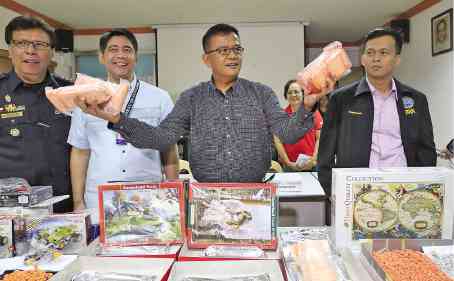P7.5-M ecstasy pills in parcels seized

CUSTOMS Commissioner Nicanor Faeldon (center) shows to members of the media the seized parcels containing more or less 5,000 pills of ecstasy with an estimated street value of P7.5 million which were intercepted at the Manila Central Post Office. JOAN BONDOC
The Bureau of Customs (BOC) recently intercepted at the Manila Central Post Office some P7.5-million worth of party drugs, including ecstasy, hidden in parcels containing toys.
In a press briefing on Wednesday, Customs Commissioner Nicanor Faeldon said they intercepted some 5,000 tablets of ecstasy, and an undetermined amount of amphetamine from the Netherlands.
Amphetamine which was found in one of the parcels is classified as a dangerous drug under Republic Act No. 9165 or the Comprehensive Drugs Act of 2002. The importation of such type of drugs requires prior import permit from the Philippine Drug Enforcement Agency (PDEA), the BOC said.
The illegal drugs were found hidden separately in five parcels declared as toys.
The drugs were found embedded inside the toy parts, the BOC said.
Article continues after this advertisementThree of the parcels were consigned to a certain Don Arnold, while the two others to one Martin Domingo.
Article continues after this advertisementThe interception was carried out by the team composed of the Customs Anti-Illegal Drugs Task Force, the Port of Manila Collection District, and the PDEA.
Online orders
According to Deputy Commissioner Arnel Alcaraz drug syndicates usually order illegal drugs online using fake identities, use bitcoins as payment and course the transit of said parcels via the Philippine Postal (PhilPost) service.
He said they had already ordered a deeper investigation into the matter to identify the individuals involved in the illegal activity.
Alcaraz said they have already identified the supposed recipient of the illegal drugs but he did not elaborate pending the ongoing investigation.
The BOC also seized some 2,000 pieces of ecstasy tablets at the Central Mail Exchange Center (CMEC) last Aug. 22, and 2.4 kilograms of cocaine at the Clark International Airport on Aug. 28.
The bureau said it condemns the transportation of illegal and unregulated drugs using various parcel systems.
“This is a particularly popular method of transport because it is relatively safe and inexpensive,” the BOC said as it warned that the bureau continues to clamp down on large and small-scale drug trafficking methods through close partnership with national and local enforcement agencies to conduct joint operations, including controlled deliveries.
Asked why there are still those who attempt to sneak in drugs using the parcel systems despite the bureau’s stricter measures, Faeldon said: “Because there is a demand. They are continuously taking a high risk of bringing drugs into the country in spite of the ongoing massive operations to stop it precisely because there is still a demand for those drugs.”
“That is how severe the issue of drug dependency in the country is. That is why we have to address it. These are evidences of the seriousness of the drug dependency of millions of Filipinos and we have to stop it,” he added.